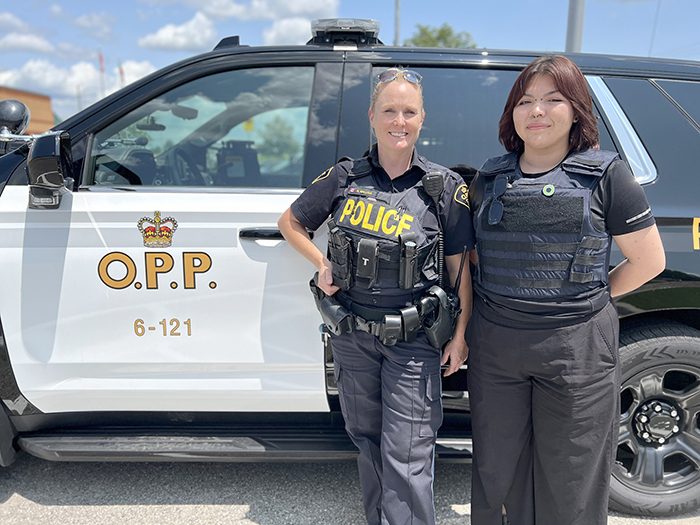
By Pam Wright
Local Journalism Initiative Reporter
Miah Parenteau’s first night shift with the Ontario Provincial Police was about as tough as it gets.
The third-year social work student, who is doing a summer Police Ethnic and Cultural Exchange (P.E.A.C.E) placement, found herself at the scene of a traffic fatality.
“Seeing the crash the first night was traumatic,” Parenteau said, acknowledging the job of policing is multi-faceted.
Parenteau, a member of the Eelunaapeewi Lahkeewiit Delaware Nation at Moraviantown, is learning the ropes of what it means to be a police officer while sharing Indigenous and youth perspectives.
“It’s super busy…there’s a lot going on for sure,” Parenteau said in a recent interview. “It’s a good experience to be able to learn the day-to-day role of being an officer and to share my knowledge of being an Indigenous person.”
Parenteau said her main goal is to share the Indigenous viewpoint, especially in light of poor relationships Indigenous people have had with police.
“I like to think my outlook on life is very Indigenous,” Parenteau explained. “I have an Indigenous perspective and that’s how I see the world.”
Parenteau, 19, is teamed up with mentor officer Const. Nicole Mailloux and will ride with the veteran officer full time for eight weeks on a paid placement. Indigenous students chosen for the program, aged 18 to 20, are exposed to the full gamut of policing.
Advocating for Indigenous people is in her family’s blood. The young woman is the granddaughter of Lana Parenteau, a woman well-known in Chatham-Kent as an activist for human rights and those of First Nation people.
“She’s the one who encouraged me to do the P.E.A.C.E. placement,” the younger Parenteau explained. “She thought it would be a good experience for me.”
With two more years left to complete her degree at Trent University, Parenteau said the OPP experience will help her in her future goal of becoming a social worker specializing in outreach and harm reduction with Indigenous populations, as well as helping un-housed Indigenous people in urban settings.
“I think this program will help me better understand how the police work, because as a social worker, you might work hand-in-hand with them,” she said.
Although they form only 4.1 per cent of Canada’s population, Indigenous people comprise about 30 per cent of those incarcerated in the nation’s prisons, according to Statistics Canada.
Creating more positive relationships between the Indigenous population and police is “critical,” Parenteau said.
“It’s important to understand that Indigenous people represent a small portion of the population, but they are represented in high numbers in incarceration rates, homelessness and poverty,” she said.
The OPP have been running the P.E.A.C.E. program in various Ontario jurisdictions for the past 10 years, but it was shelved temporarily because of the pandemic before resuming this year.
Const. Shawn Eagen, who is assisting with the P.E.A.C.E. program, said the initiative is a two-way street.
“It’s a cultural exchange,” Eagen said. “We’re hoping to learn some culture from Miah, while she is going to learn the job roles of a police officer.”
A total of 33 officers work out of the Chatham-Kent detachment covering Highway 40 and Highway 401, Lake St. Clair, Lake Erie and both Wheatley and Rondeau Provincial Parks. The detachment also provides backup to the Delaware Nation Police.
Along with riding with Mallioux, Parenteau will take part in marine patrol and assisting officers on her home territory.






